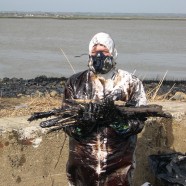Black Whales
Subjet : BP Oil Spill
The cumulated amount of oil in the ocean is estimated to range between a low bracket of 300,000 and high a high bracket of 500,000 tons. The Gulf of Mexico has a surface area of 1,500,000 km²; on May 2nd fishing was prohibited within a closed area of 17,000 km². Today, the no take zone extends to 225,000 km². The sale of potentially contaminated seafood must be forbidden to avoid any risk of poisoning Americans.
Yet, other mammals feed exclusively on seafood in the Gulf of Mexico and its adjacent seas. According to NOAA (National Oceanic and Atmospheric Administration), 29 species of marine mammals are present in the Gulf of Mexico. In “normal” conditions, they are exposed to the risk of collisions and to acoustic disturbances caused by maritime transport and the numerous offshore oil and gas platforms. Amongst marine mammals, the most vulnerable are the Manatees. Threatened with extinction, these pacific and slow moving sea cows are already victims of propellers from ships and recreational crafts. Manatees are extremely sensitive to oil spills and to the saturation of their preferred food : underwater meadows of sea grass.
Round Robin # 4 Petrol traps on the Isle of Er
Round Robin n°4
Over the last 40 years, the Isle of Er facing Plougrescant in the Côtes d’Armor, has become a disaster area from the wastes of the oil spill of the Torrey Canyon, and with time passing other accidents, such as the Amoco Cadiz and the Tanio, have added to the problem.
The wastes are left in the open. Er is a private island, which coastline is accessible to everybody by boat, or at equinox ebb tide, by foot. No warning signs indicate to the users of the coastline the potential physical danger which the waste pits represent.
Oil slick Queen demolished in Bangladesh ?
According to informations coming from Chittagong, three container ships managed by German companies have just been put on sale on the demolition market. These three vessels are the joint property of KGAL, based in Germany, the largest European maritime leasing* company, and subsidiary of Allianz and Dresdner Bank, and of V Ships Germany, subsidiary of V Ships Monaco, the largest manager of commerce vessels in the world.
The Ankara, the Maersk Brisbane, and the Maersk Barcelona (Maersk is solely the charterer) were built in Germany in 1975-1976 and are motorized by vapor turbines whose installation requires large quantities of asbestos. These three sisterships have a lightweight of 15,000 t each.
Already, V Ships and KGAL have made it known that they will assign the container ships destined for demolition to the highest bidder, that is to say to Bangladeshi demolition shipyards, at around $700 per ton while the average price in India is around $550 per ton.
Considering social, sanitary, and disastrous environmental conditions in Bangladesh, Robin des Bois asks these European companies to either proceed with the preliminary removal of asbestos, to choose the best Asian demolition shipyards within the framework of a specific partnership, or even to demolish and recycle these vessels in Europe. A letter was sent to them in this respect.
The three container ships are frequently in European waters and one of them, the Maersk Barcelona, appeared on the Atlantic front in September 2005, near the island of Sein, off Brittany, by a record “61 km (38 miles) oil slick” that was sanctioned by an $800,000 fine. The inspectors from the vessel security center had revealed a lack of care for the oily waters treatment installation.











